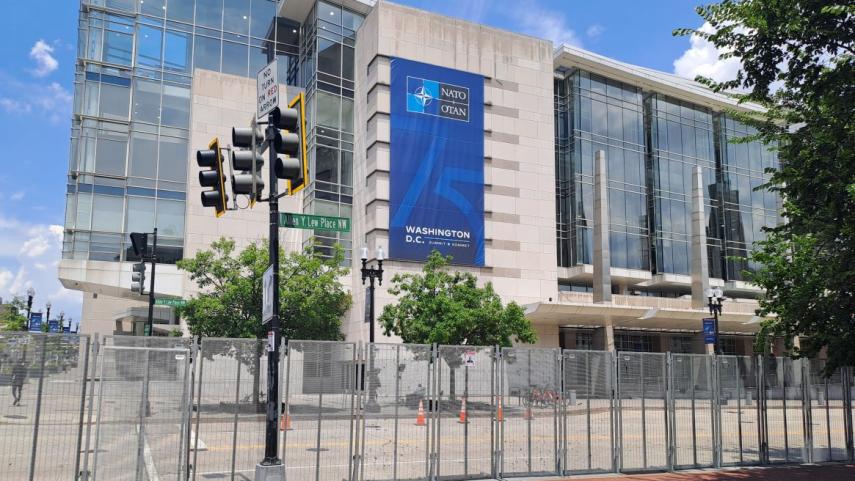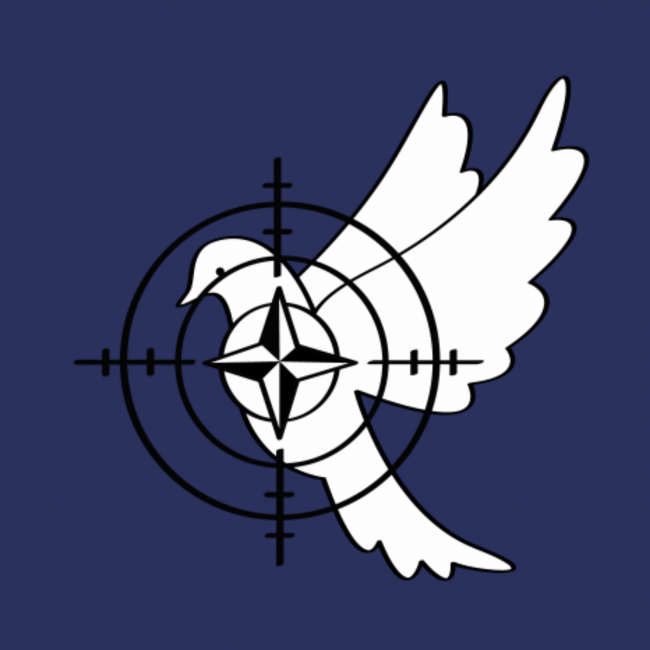NATO has just celebrated its 75th anniversary in Washington. The war in Ukraine gave new wind to the military alliance, declared brain-dead by President Macron five years ago. "We have undertaken the biggest reinforcement of our collective defence in a generation", reads the Washington summit's final declaration proudly.
There is little to celebrate. In Europe, we hear the drums of war banging. As tensions rise, so does armament. The nuclear weapons threat has never been higher. According to former European Council President Charles Michel, we should even switch to a war economy. "Our commitment to defend one another and every inch of Allied territory at all times is iron-clad" as it is combative declared at the NATO summit in Washington.
At this cynical party soaked in militaristic hubris, the core message can be freely translated as: diplomacy has failed and it is the 'other' we have to blame for. To suggest that NATO has its share of increased international tensions is a form of profanation. Critical voices on the legacy and current guise of NATO are scarce.
NATO’s history real ‘values’
Final declarations at the now yearly NATO-summits invariably repeat the mantra that NATO is founded on shared values of "human rights, democracy and the rule of law". This is also how it is written in NATO's 1949 founding treaty,... with the Portuguese dictatorship of Antonio Salazar as one of its 12 founding members. The US and NATO would then tolerate, support or help organise military coups in numerous countries including Greece and Turkey, two NATO member states. In those early decades, several NATO countries fought bloody colonial wars where discrimination, looting and repression were commonplace. During the Cold War, the fight against communism took priority over the defence of the rule of law. Even after the Cold War, NATO wars or military agressions by its member states disrupted the Balkans, Afghanistan, Iraq and Libya. Each time, the civilian population paid a heavy toll. Today, we see how Israel can destroy Gaza with diplomatic and military support from several NATO member states. Human rights? International law? Much is stated in Washington's final declaration, but not a word about Gaza.
NATO knew it was provoking a war in Ukraine
NATO's eastward expansions in Europe after the Cold War, can hardly be interpreted as a "the desire to live in peace with all peoples and all governments" as the first sentence of the NATO treaty reads. NATO leaders were well aware of the potential risks. It created tensions with Russia from the outset. Documents just surfaced show that then-security adviser Anthony Lake warned US President Bill Clinton in 1995 that "the Russian leadership will do its level best to derail our policy, given its conviction that any eastward expansion of NATO is at root antithetical to Russia’s long-term interests". Then-Russian President Boris Yeltsin, had earlier sent two letters to his US counterpart to express Russian concerns on NATO expansion and in which he warned: " Not only the opposition, but moderate circles as well [in Russia], would no doubt perceive this as a sort of neo-isolation of our country in diametric opposition to its natural admission into Euro-Atlantic space". Nevertheless, between 1999 and 2004, 10 countries joined the military alliance.
When plans were on the table to include Ukraine, William Burns, then US ambassador to Moscow (and current CIA director), wrote in a confidential report: "Experts tell us that Russia is particularly worried that the strong divisions in Ukraine over NATO membership, with much of the ethnic-Russian community against membership, could lead to a major split, involving violence or at worst, civil war. In that eventuality, Russia would have to decide whether to intervene; a decision Russia does not want to have to face".
In other words, the decision at the 2008 NATO summit in Bucharest to give Ukraine the prospect of membership was an act of self-fulfilling prophecy. France and Germany opposed it at the time because it was - in the words of French Prime Minister Fillon - "not a good answer to the balance of power between Europe and Russia." The US pressed ahead, upon which military cooperation (including annual manoeuvres) with Ukraine was immediately scaled up. Last year, NATO Secretary-General Stoltenberg himself admitted before the European Parliament that Russia went to war to prevent "NATO, more NATO, from getting close to its borders".
In other words, he said Ukraine's neutral status could have prevented a bloodbath.
Since the Russian invasion, there has been only one policy: Keeping Ukraine in the war to "weaken Russia", dixit US Defence Secretary Lloyd Austin on the long-term goal of the war. According to an April investigation published in US magazine Foreign Affairs, Russia and Ukraine were on the verge of signing an agreement shortly after the illegal Russian invasion because both countries soon realised they could not achieve their goals militarily. They were willing to make far-reaching concessions with central neutrality and conclusive security guarantees for Ukraine, which amounted to what applies to NATO member states in Article 5 (if one country is attacked it is considered an attack on all others). However, the US and UK refused their support and encouraged Kiev to fight on. Since then, tens of thousands of soldiers have died on both sides of the front.
Militarisation
NATO adopts a 'blame-the-other-discourse', but with its eastward expansion policy and - in recent years - military build-up in Asia, it itself bears a great responsibility in the militarisation of international relations. Its confrontational policy against Russia and China, which NATO calls "systemic rivals", is fuelling a dangerous arms race and has helped to increase the risk of nuclear war. The doomsday image of an imperial Russia about to invade Europe - even though opening a second front with NATO would be a Russian suicide mission - is an ideal excuse for the militarisation of Europe. In the run-up to the NATO summit, NATO Secretary-General Stoltenberg proudly announced that now 23 member states spend at least 2 per cent of their GDP on their military. According to a recent NATO report, member states will spend 18 per cent more this year than last year. NATO accounts for well over half of global military spending, a share that will continue to grow. The military industry is thus seeing its influence grow and doing big business. Not coincidentally, on the margins of the summit, there was a conference with military industry and policymakers aimed at strengthening the military-industrial base and ramping up arms production.
The absurdity is that the commitment to increase military spending (in the NATO context) is accompanied by the EU obligation in some European NATO countries to tighten its budgetary belt. To make it concrete with one example: Belgium is required by the EU to seek 27 billion in savings over the next seven years. At the same time, the military budget must increase to at least an additional €5 billion annually to meet NATO's 2% standard.
Militarisation prevents action on global social and environmental threats
The plea of historic European leaders such as Willy Brandt or Olof Palme for disarmament and constructive neighbourhood ('common security') at the end of the Cold War has been replaced by the opposite: more weapons, more military spending and an a priori hostile attitude towards 'systemic rivals' with les or no room for diplomacy or negotiations.
Tensions between militarised blocs prevent rapid action to save our planet from the real threats such as climate change, inequality, poverty and nuclear weapons. We need a security system that is people-centred, inclusive and based on respect for mutual security interests, on common security. NATO does not meet those objectives. In Europe, we urgently need a ceasefire to avert a potential escalation and pave the way for new disarmament negotiations. In the Middle East, the West must show that it consistently defends human rights and international law by ending the genocide in Gaza. In Asia, we need a major security conference with China to discuss mutual security concerns. In the world, we need human security where everyone has access to basic needs as an important condistion to prevent violent wars. It is time to change course to a peace policy with visionary leadership that has understood that humanity cannot go on like this.



